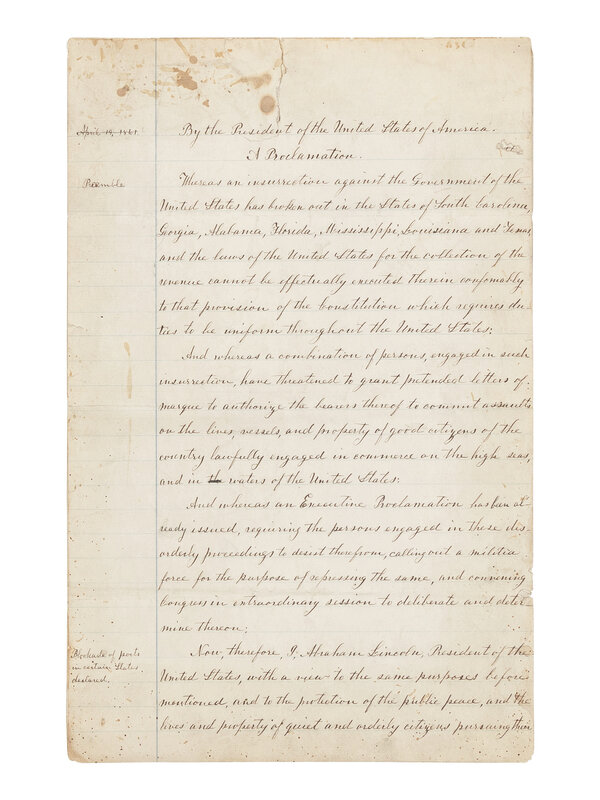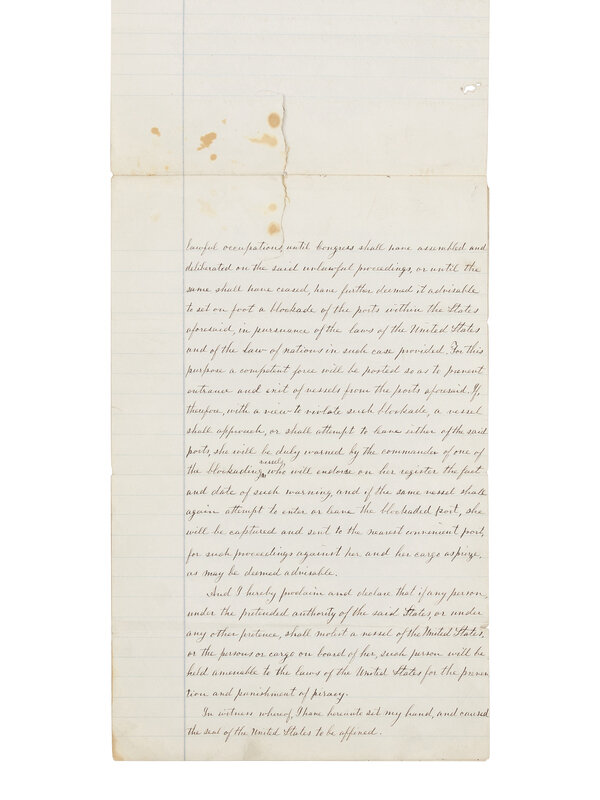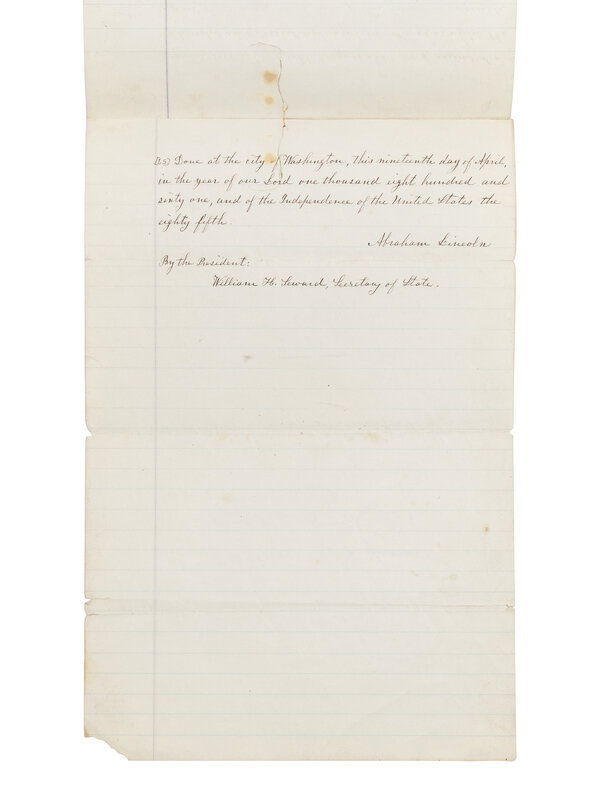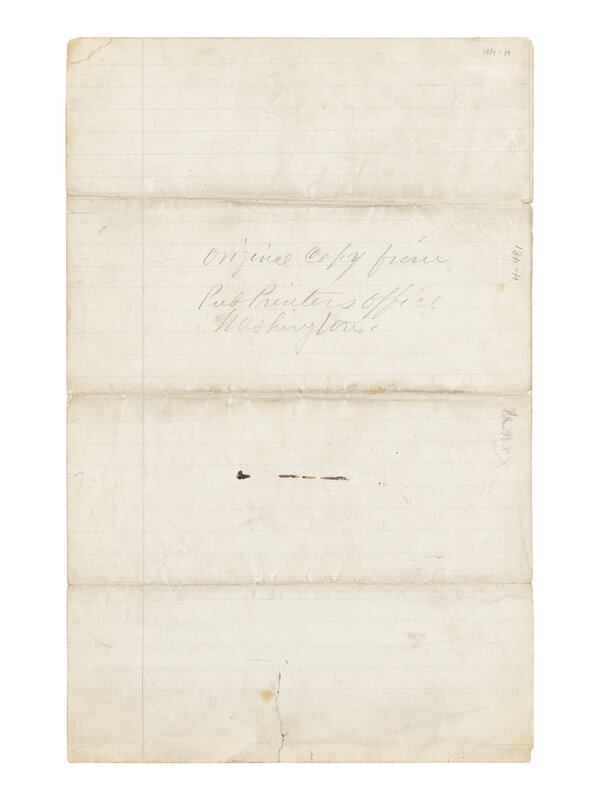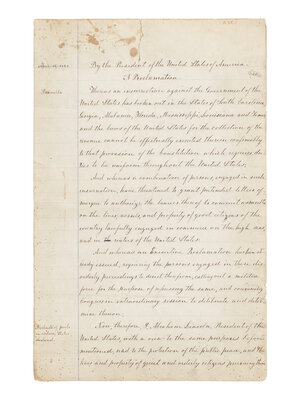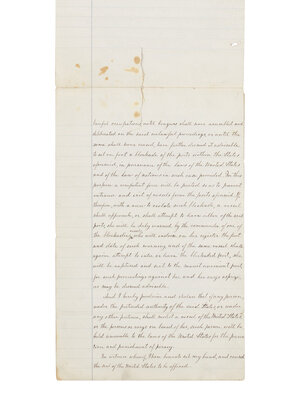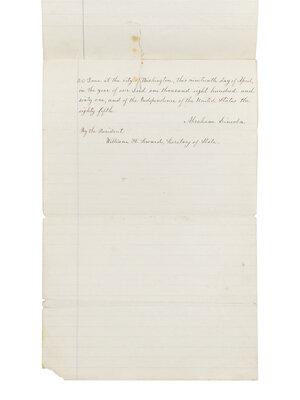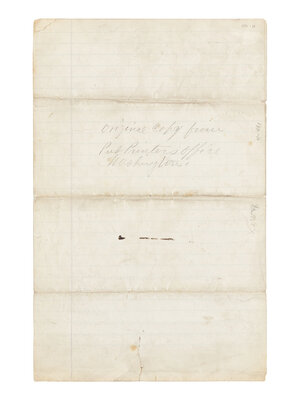Condition Report
Contact Information
Auction Specialist
Lot 62
Sale 6441 - Lincoln’s Legacy: Historic Americana from the Life of Abraham Lincoln
May 21, 2025
10:00AM CT
Live / Chicago
Own a similar item?
Estimate
$20,000 -
30,000
Price Realized
$17,920
Sold prices are inclusive of Buyer’s Premium
Lot Description
[LINCOLN, Abraham (1809-1865)]. A fair copy manuscript of Lincoln's proclamation ordering the blockade of all Confederate ports. Washington, D.C., ca. 18 April 1861 or before.
3 pp., on rectos only; 12 1/2 x 8 in. (317 x 203 mm). Manuscript emendations and corrections in ink; secretarially signed on behalf of President Lincoln and Secretary of State William Seward. Integral leaf with note in later hand, "original copy from Pub Printers Office Washington." Sheets affixed at top edge, first leaf starting; creasing from old folds; scattered soiling; closed tear at top of each page; extremities lightly worn.
"Whereas an insurrection against the Government of the United States has broken out... I, Abraham Lincoln...have further deemed it advisable to set on foot a blockade of the ports within the States aforesaid..."
A VERY RARE PUBLISHER'S CORRECTED MANUSCRIPT OF PRESIDENT LINCOLN'S IMPORTANT PROCLAMATION issuing a general blockade of ports in the seven Southern States that had seceded from the Union (South Carolina, Georgia, Alabama, Florida, Mississippi, Louisiana, and Texas).
The final text of the proclamation was printed by the Government Printing Office on April 19, 1861, in both broadside and bifolium format, and reflect the manuscript emendations in this document.
One week later, Lincoln extended his order to include Virginia and North Carolina, after their State Congresses also signed secession ordinances. The general blockade was issued days after the attack on Fort Sumter, and in response to the Confederacy's announcement that it would authorize privateers to attack Union ships in the Atlantic. While only partially effective at the outset, the blockade proved an effective Northern tool as the war progressed, eventually ruining the Southern economy. Once the Union Navy increased in size and capabilities, it was able to drastically reduce shipments into Confederate ports. Regional "Blockade Squadrons" were set up, patrolling different sections of the Atlantic and the Gulf of Mexico. The Navy's efforts limited the import of military and other crucial supplies to the Southern states, and almost totally cut off cotton exports, the Confederacy's main source of revenue.
During the first weeks of the war, Lincoln acted swiftly to combat the growing insurrection while Congress was in recess until July. He and his cabinet broadly expanded their wartime powers through executive actions, such as this blockade, as well as the call to raise 75,000 militia volunteers, and the suspension of the writ of habeas corpus. "Lincoln took decisive hold of the government...he raised and supplied an army, sent it into battle, held the Border States in the Union, thwarted Confederate attempts to win European diplomatic recognition, declared a blockade, asserted leadership over his cabinet, dealt effectively with Congress, averted a potential crisis with Great Britain, and eloquently articulated the nature and purpose of the war..."(Fehrenbacher, Lincoln’s Wartime Leadership: The First Hundred Days p.18). Basler 4, pp. 339-340.
Provenance:
Louise Taper, Beverly Hills, California
Exhibition:
The Last Best Hope of Earth: Abraham Lincoln and the Promise of America, at the Huntington Library, October 1993-August 1994.
Property from the Abraham Lincoln Presidential Foundation
This lot is located in Chicago.
